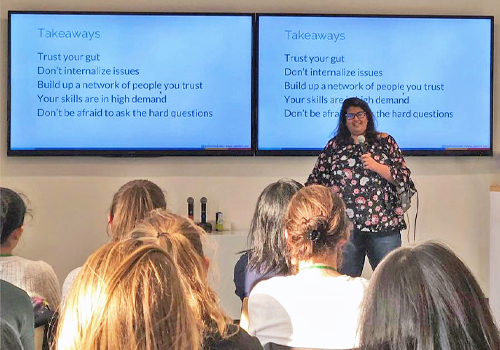She was the first female student union president at U of T’s computer science department in more than a decade and created UofTHacks — a now iconic annual student hackathon event — but in the work world, Arts & Science alumna Aashni Shah struggled to get recognition for her accomplishments.
The dilemma inspired her HypeDocs startup, an online tool that enables people to track personal achievements, boost their self-confidence and overcome feelings of imposter syndrome, says Shah, who earned her honours bachelor of science in computer science in 2016 as a member of St. Michael’s College.
“It’s built for everyone, but with a focus on women and underrepresented minorities,” says Shah.
At its core, HypeDocs is a living list of wins and achievements tied to personal or professional goals, whether it’s starting a new exercise routine or landing a dream job.
The goals are added to a customized platform where users can update and track goals, record progress and document achievements.

“At work, this tool gives them a better chance of getting the recognition and promotions they deserve but are sometimes denied because their managers aren't always following the work they do. At home, it lets users remember their accomplishments and build a positive mindset.”
HypeDocs also includes encouraging weekly email reminders as well as a “public page” where users can selectively share anything they choose.
Shah says there is an important mental health aspect to HypeDocs, especially in the midst of a job market distorted by the pandemic.
“People are feeling deflated and unhappy. A lot are still looking for jobs and are not finding any available. Others have lost their businesses and have to find a job for the first time in many years,” says Shah, adding she uses HypeDocs herself.

“The impact it's had on both my mental health and my ability to negotiate for job offers or promotions is pretty powerful.”
Shah was born and raised in Nairobi, Kenya and moved to Toronto in 2011 to attend U of T. She says the idea for HypeDocs came from a group of female engineers at the financial tech company where she formerly worked who used a similar tool to track achievements while avoiding the sense they were boasting.
The glaring need for tools like HypeDocs is evidenced in the job market disparities that persist for women and underrepresented minorities.
These groups tend to make less money and often get overlooked for promotions. They also perform many extra tasks or “glue work,” like identifying pending issues and resolving them, that are not necessarily part of their job description but demonstrate leadership qualities, she says.
Women and underrepresented minorities also face their own internal struggles with “imposter syndrome” when it comes to negotiating for a better salary or job.

“What I’m trying to do with HypeDocs is help you overcome that impulse and give you the confidence you need so you can see you deserve this promotion,” says Shah.
“This tool provides a quantitative list of reasons to go and ask for the raise or promotion. And at that point, there's really no way a company or your employer or manager can say ‘no’ because you literally have a list of proof.”
Shah says she wishes she’d had something like HypeDocs to turn to when she was in university. Her advice to current students is to make the most of their time at U of T.
“Find your people, the ones you can rely on, because having those people along for the journey will make it memorable and fun,” says Shah.
“It's important to get your formal education but also spend time joining clubs, going to events and finding other ways to meet people. The connections you’ll make will be so powerful and help open doors down the road.”

